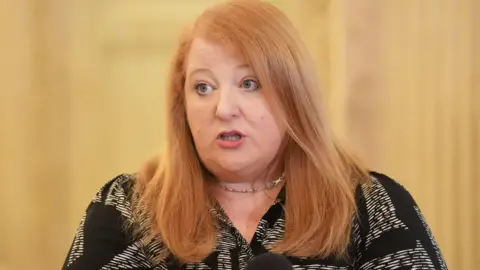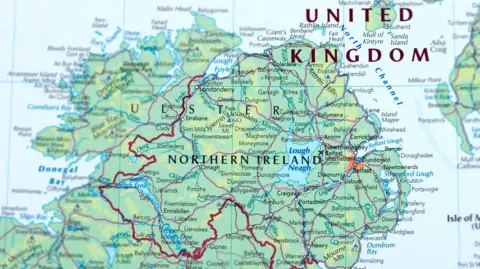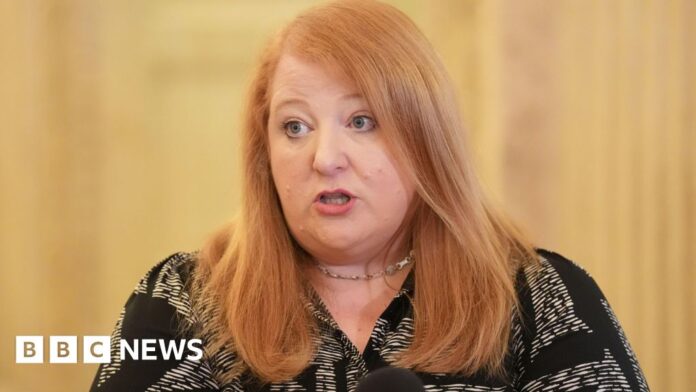 PA Media
PA MediaAlliance Party leader Naomi Long has called for the Northern Ireland secretary to set out the criteria for when he would call a border poll.
The Good Friday Agreement (GFA) says a referendum must be held if the secretary of state believes it is likely that a majority of people in Northern Ireland would vote for Irish unification.
However, how that is measured has never been made clear.
Now Long, who is also Stormont’s justice minister, has said she believes the British government must give certainty about the process.
“I think it would be helpful for the secretary of state to set out what the conditions for a border poll would be,” she told the BBC’s Borderland podcast.
“What I think is toxic at the moment is by not setting out the conditions every single election becomes a kind of proxy for a border poll.”
What does GFA say about a border poll?
The Good Friday Agreement, also known as the Belfast Agreement, was a political deal designed to bring an end to 30 years of violent conflict in Northern Ireland, known as the Troubles.
It was signed on 10 April 1998 and approved by public votes in Northern Ireland and the Republic of Ireland.
It set up a new government for Northern Ireland, representing both nationalists and unionists.
The agreement says that Northern Ireland is part of the UK and this can change only through a referendum.
The secretary of state must hold a border poll if it appears likely that a majority of people in Northern Ireland would vote for Irish unification.
There is no detail in the agreement on how the secretary of state should judge whether there is majority support – but they can decide to hold a border poll at any time, provided that there has not been another in the last seven years.
There is also debate as to what form a border poll should take, for example whether the poll should be held on the general principle of unification or after specific proposals have been set out for how a united Ireland would be governed.
The third episode of Borderland – UK or United Ireland? focuses on the political middle ground in Northern Ireland – voters who don’t identify as only British or Irish.
The Alliance Party’s share of the vote has grown substantially over the past 20 years and political analysts believe their support could be crucial if a border poll was ever held.
“I don’t think we will see a nationalist or unionist majority any time in the foreseeable future in the Assembly,” said David McCann of Ulster University.
“My view has always been that this goes through one woman… and that is Naomi Long.
“It is whenever she and her party decide it is time to have this conversation.”
 Getty Images
Getty ImagesReferendum assessment
Long said that she would prefer if the assessment on whether to hold a referendum was based on polling rather than electoral results.
“People’s reasons for voting in different elections in different constituencies are influenced by so many things,” she said.
“In the interim we do need to test the proposition.
“What it would cost? How it would work? What happens to your pension contributions?
“All those basic things that, to be honest, nobody really focused on when it came to Brexit.”
Earlier this year, when she was a junior Northern Ireland minister, Fleur Anderson told the Agenda NI magazine that the decision would be based on opinion polls.
However, the Labour MP is no longer a minister and at the time the Northern Ireland Office appeared to distance themselves from her comments insisting that “the responsibility for a referendum sits solely with the secretary of state”.
The first three episodes of ‘Borderland – UK or United Ireland’ are available now on BBC Sounds and other podcast providers.




